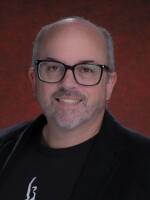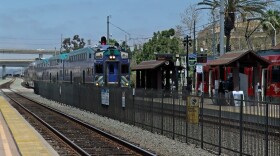MS: Welcome to our discussion of the week's top stories. Joining me at the roundtable today Jean Guerrero, Eric Anderson, Chris genuine and I meet the Sharma. Bashing California's immigration policy was Donald Trump's main theme during his San Diego visit this week. He blasted California sanctuary laws claiming thousands of dangers and violent criminal aliens are released as a result. Trump inspected prototype said the border crosses are like professional mountain climbers. They are incredible climbers. Who knew. I did want to talk about something very serious, the Trump's repeated claims about violent crimes committed by undocumented immigrants. JG: I echoed what we saw earlier and it was all over the Internet using this one immigrant who bragged about killing these two police officers. The reality is, this claim is not supported by the data, it shows that immigrants are less likely to create -- commit a crime. Immigrants were here legally are 44% less likely and immigrants here legally are even less. Also if you look at data, most of the people who are arrested by ice are arrested for traffic offenses. MS: So this is a wild exaggeration. I wanted to get to the specific visits. You talked about the Trump people turning up near the border. What were they saying ? EA: There were plenty of people who gathered near the border. Kind of insight of the border but I really next to it and they were nowhere near where the president was. About 200 people gathered there and you heard the same theme. People were concerned about criminals coming across the border and getting in contact with their family. You can see that fear was a driver of what they were talking about too. What really struck me, two things about the protest, the fact that it was isolated from everyone by their choice. The day before they had been planning to be in the same location as some anti-Trump protesters. They moved that and because they were isolated, and had a surreal impact. It was like a little bit of a reunion that you go to. A bunch of like-minded people getting together and enjoying their similar views and showing their support for the president and their support for the presidents policies. I think it was done by the organizers. They were worried that they would be too close to the anti-Trump protesters and that would create problems. JG: When the Trump protesters, the anti-Trump protesters they wanted to be away from the pro-Trump people. They ended up going to the Florida entry the day before Trump's visit. The day of it was a lot bigger somewhere between 200 and 300 people. MS: San Diego Republic mayor did not tell the Trump line. JG: He put out an op-ed talking about the economic trade with Mexico having a good relationship with Mexico. He talked about building bridges with him and not walls. He noted that San Diego was one of the safest cities in the United States so despite the proximity and relationship with Mexico he pointed that out. Just talking about how the strong economy and trade is not incompatible. MS: We have a bite from the president here on the specter of drug cartel violence. Let's hear that. MS: His original budget cut in half, money going to Mexico to fight cartels but he has since came around on that. CJ: I think this plays very well with his base. You mentioned fear and crime but what's interesting is if you look at the uniform crime statistics, among the safest cities in United States were bordered cities. You think that if immigrants, especially those coming from Mexico were a danger to the country then you would see a much higher crime along the border and you don't. JG: The fact that the people were very upset with the fact that Trump would not be meeting with the governor or spending any time with the mayor. It's an unusual thing. MS: That's a beautiful Segway. During his visit Trump continue bashing California. He threatened to withdraw law enforcement agents and we got a bite from the governor -- Trump on the governor. EA: This was a theme you heard at the pro-Trump rally as well. There were speakers there who specifically called out Olivia shaft and asked her to be put in jail. Also Tim Donnelly was one of the former men who was running for another office in California and he was saying also Jerry Brown needs to be behind bars because of the positions that he has taken. You kind of heard that campaign and it was like feeding me the dogs. It was well received by the people. MS: People gave him again Pinocchio for his characterization. What was Governor's Brown's response is my JG: He said thank you for the shout out but says that California is the most prosperous state in America and echoed the theme by the mayor. I don't believe he addressed the crime allegation directly but California crime rate is currently at a historic low. One of the other things that the governor pointed out was the high-speed rail project in the Central Valley and inviting the president to check it out. AS: It seems like the federal government is gunning for a fight with California and it almost seems like California is gunning for a fight back with the government. CJ: California in many ways represents a totally different way of thinking about the United States. Look at our companies. We are world beaters, we are in no way the back word state that perhaps Trump is trying to present us as. Ironically the same day he was here, a report came out to show that California has one of the lowest effective tax rates. We have an income tax or property taxes are lower than most others. A lot of what you are hearing is simply propaganda for the base and not reality. AS: Those undocumented immigrants are paying those taxes. They are huge contributors to the economy. CJ: They're paying Social Security for the retirees. AS: And are not reaping the Social Security. JG: You mentioned how does he get away with it. The thing is illegal immigration is a complicated problem and the wall, when people are dealing with these problems they want a simple concrete solution. MS: Most people don't even come over the border that way. All right we will leave it there. The much talked about hospital takeover was killed this week by President Trump. Both the Democratic and Republican lawmakers have opposed a deal and Trump blocked it on national security grounds. Let's start with how much this offer was and tell us about them taking it over. CJ: It began at 105 It began at $105 billion and it became 117 billion and then it was cut back a little bit more. That is billion with a B. Any one of the figures would have made it through the technology merger and history. The national security issue was that [ Indiscernible ] has the world beating technology that would make smart phones of the future faster than a regular connections through cable and fiber. There was concern that if it was required by a base company, technology might fall into the hands of China and other bad actors directly. The acquiring company was a Singapore company only in name and physical presence. The CEO is un-American and brought Tom began as a California company. [ Indiscernible ] began to aggressively acquire other connector companies under the name of [ Indiscernible ]. A few weeks before the hostile offer for [ Indiscernible ], he appeared at the White House with President Trump saying he was moving to San Jose. AS: Do you think that the White House was offended by that ? I read somewhere where it said that don't screw with the federal government. They took that announcement and he planned to move his headquarters. Do you think it influenced the White House ? CJ: It was certainly mentioned in a letter that was sent. I think it was a week ago Sunday. He said it in the meeting and they moved up the paperwork faster than it was permissible. It was probably a factor. MS: I want to ask you about Paul's place in San Diego. You had on your website that the UT is not reporting as well. CJ: What really drove this whole take over attempt was a intuitional -- that it was focused on the long-term and not enough on short term. There was a lot of concern amongst [ Indiscernible ] board that their long-term innovation would be zapped by this. As it evolved, they are now a free public company but if you want to avoid this kind of thing again maybe go private. EA: They have a long history of legal interaction. It seems like this is really kind of a surprise when it was made public. Did [ Indiscernible ] drop the ball here ? were they not aware of their surroundings ? CJ: I don't think they saw it coming. We heard about other big deals but this would have been the biggest by far. They fought back in many different ways, they called it takeover theater. What [ Indiscernible ] was trying to protect was its future. It has an extremely strong future. With 5G you can download a high-definition movie in about two seconds. That is going to be a big change. Their reading and automotive electronics -- there leading in automatic -- automotive electronics. If you put all of those things together it's an incredibly -- if you can buy it it would be a great thing to have. If you can keep it separate maybe it can be a very strong performance for the long-term. MS: Let's talk about their place in San Diego and how important it is. EA: It has about a $5 billion economic impact here in San Diego. If you count all of the spinoff jobs, they say it's probably responsible for about 36,000 jobs. The impact here has been significant. They contribute to many nonprofits and well-meaning resources here in San Diego. They have had quite an impact here and to lose that through the transfer of ownership I think would have been a dramatic impact. CJ: It employs so many highly skilled and educated innovative people. If it had cut costs as is known to do, [ Indiscernible ] would be gone. There are some people that support arts and culture and those of the people that lead to the local startups. Sando -- San Diego status would've been friend. MS: Plenty more to come as we see what happens. Many of us who grew up in Paris places like the Midwest, they don't call it the Golden State for nothing. San Diego's sunny seaside promise moralized by the Beach boys. How much has the middle-class been shrinking ? AS: In the state of California, the middle-class have gone from being about 60% of the population in 1970 down to over half the population now. I should say that percentage is almost mirrored across major cities in the United States. MS: Let's define what is the middle-class ? AS: The public policy Institute defines people in the middle-class as families making between $49,000 a year and $174,000 a year. MS: Before we get a little deeper into that, I wanted to step back here, this is part of the California dream project here. Explain what were talking about. AS: The dream project has assembled a team of public reporters across the state who are basically looking at what has happened to the dream and a it has been and where it's going. There are a lot of people who believe that California is not what it once was. Today people are struggling to find a job, they're struggling to pay for college and they're struggling to buy a home and to rent a home. MS: Your story on the shrinking middle class probably defines three types of Californians. AS: You're the top income earners who have seen their incomes rise about 40% since 1980. Then you people in the middle who have seen their wages rise 5% since 1980 and then people at the bottom and their incomes have declined 19% since 1980. MS: We have Joel call let's hear from him on how this trend is transpiring in California. [Clip] Today we have a society which overtime is becoming more and more [ Indiscernible ] with some of the richest people at the top and a diminishing middle-class and what's most frightening is what's happening to the other people. MS: How does he characterize those. AS: He says a key group that's leaving the state ranges between the ages of 30 and 50 and making somewhere between $100-$200,000 a year. The people who are coming in are wealthy and super educated and he saying that's not the case. CJ: One thing that I think you found in your research is that there was a big transition at the end of the Cold War. For that time manufacturing and military relations went away. AS: The decline wounded the California economy and subsequently wounded all of other areas. Now, over the last several years you have seen companies like Toyota, Nissan, Ford leave the state of California because of high housing costs. Those are the companies that paid $80,000, $100,000, $120,000 a year and salaries that middle-class families can assist on. What people say is more alarming is that the companies are not expanding. MS: You interviewed one couple that moved away. What did they say. AS: Kelly is a woman who left San Diego a year ago. She's a realtor and her husband is a IT manager. They paid a little bit over half of their income on the mortgage, on taxes and on utilities. She moved a year ago to northern Texas and lives in a 4000 square feet home and pays less than she did in San Diego. She said the schools are great, she pays 30% less on taxes, no state income tax and looks that California with a sense of anger. CJ: I wonder how much of it is housing. If housing can be made more affordable through whatever techniques whether more buildings or changes, but that's all a lot of those problems ? AS: Yes housing is super expensive but the jobs are here. Even the jobs that are here, Jewel said it used to be that it was accepted that you paid three times your income to buy a house but now that has gone to 10 times and sometimes -- your annual income. You have to make three times the rent in order to qualify to rent a place in San Diego. CJ: This is such a magnet. You have all these people moving in and maybe they are living to in a room or three in a room but there is still that magnetism in California. Maybe not for the middle-class but maybe for a very educated individual. MS: We have to leave it there. You will find more stories at our website. It wraps up another week of stories at the KPBS Roundtable. I would like to think my guess -- say Thank you to my guess. All the sores we discussed today are available -- stories we discussed today are available on a website.
President Trump Visits San Diego
The Story
President Donald Trump’s first visit to San Diego included a personal viewing of designs for his border wall project and a speech to Marines at MCAS Miramar. During his stay, the President criticized California’s sanctuary policies on immigration and highlighted a surge in defense spending. The whirlwind stop also brought out demonstrators for and against the President.
The Discussion
How did local politicians embrace or distance themselves from President Trump?
How is President Trump tying Mexican drug cartel violence to the need for a border wall?
What was the message from demonstrators on both sides?
RELATED: America’s Wall: Decades-Long Struggle To Secure US-Mexico Border
Qualcomm Takeover Bid Blocked
The Story
The federal government intervened this week to stop an attempted takeover of Qualcomm, arguing recent moves by Singapore-based Broadcom pose a national security risk. After Qualcomm rejected recent buyout offers, Broadcom was seeking to change the makeup of the San Diego-based company’s board of directors to effectively force a sale.
The Discussion
Will the intervention ease unrest from Qualcomm investors?
How important is Qualcomm to San Diego’s economy and image?
How did Mayor Kevin Faulconer praise the Trump administration for this move?
RELATED: Broadcom Officially Drops Qualcomm Bid After Trump Decision
Chasing the California Dream
The Story
The California Dream is a new statewide public media collaboration focusing on the changing economic realities in the Golden State. KPBS reporter Amita Sharma will cover wealth and poverty. Her initial report dives into California's shrinking middle class, and how more people are deciding to leave the state due to the rising cost of living.
The Discussion
What is the “California Dream” and how did it emerge during the post World War II economy?
How has the percentage of middle class Californians shrunk in recent years?
Why are more people choosing to leave California?
RELATED: California’s Middle Class Is In Decline, Despite The State’s Immense Wealth








